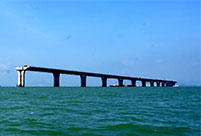


Trade ministers of the United States and 11 other Pacific Rim countries attend a press conference after negotiating the Trans-Pacific Partnership (TPP) trade agreement in Atlanta, the United States, on Oct. 5, 2015. Trade ministers of the United States and 11 other Pacific Rim countries "have successfully concluded" the Trans-Pacific Partnership (TPP) free trade talks, U.S. Trade Representative Michael Froman said Monday. [Photo/Xinhua]
The Ministry of Commerce on Tuesday said China welcomes the agreement on the Trans-Pacific Partnership free trade pact and hopes it can facilitate talks on other regional free trade deals to push economic growth in the Asia-Pacific region.
The comments came after the trade ministers of the United States and 11 other countries in the Pacific Rim reached an agreement on the TPP in Atlanta on Monday, even though the final ratification of this ambitious deal in the member nations is far from certain.
After more than five years of negotiations, the agreement was signed by Australia, Brunei, Canada, Chile, Japan, Malaysia, Mexico, New Zealand, Peru, Singapore, the US and Vietnam, which together account for 40 percent of the world economy.
The ministry's spokesperson said this agreement is one of the most important free trade deals in the Asia-Pacific region, and China takes an open attitude toward efforts and actions that promote regional economic integration and system development in the Asia-Pacific region under the rules of the World Trade Organization.
Zhou Shijian, a senior researcher on trade relations at Tsinghua University in Beijing, said the process for all participants to gain the approval of their legislative bodies back home will take months or even longer, and approval for the deal is not certain as it will confront various challenges stemming from other political factors.
Canadian trade officials, for instance, were under pressure to get an agreement before the federal election in that country on Oct 19. But while Canadian Prime Minister Stephen Harper is a strong supporter of the TPP, his prospects in the election remain unclear. Tom Mulcair, the leader of Canada's New Democrat Party, which until recently was leading the polls, said on Friday that if he wins his government will not be bound by any TPP deal signed by Harper.
Meanwhile, there were protests against the TPP outside the venue in Atlanta where the TPP negotiations were being held, and the agreement still has a long way to go before it reaches the US Congress for possible ratification. Several Republican and Democratic presidential candidates have already begun attacking the deal.
There are still differences to be ironed out as well, Australia is keen for other member countries to grant more favorable tariff rates or zero tariff treatment for its agricultural products, and Japan demands other members further lower their tariff charges on its auto parts and vehicles, both of which to a certain extent would hurt other members' interests.
The content of the TPP talks mainly covered intellectual property protection, cross-border e-commerce, investment, the service trade, government procurement, labor treatment, environment and tariff reductions.
Zhao Zhongxiu, a trade professor at the University of International Business and Economics in Beijing, said the TPP is dominated by the US currency and its financial policies, and it would to a certain extent consolidate the position of the dollar as the dominant global currency through trade between its members.
"Under such circumstances, the financial resources of the 12 TPP members will be integrated and indirectly controlled by the US. This is something that will hurt China's efforts to boost exports and promote the use of its currency globally," Zhao said.
Gao Hucheng, China's commerce minister, said earlier this year that the country will continue to study and assess the impact of the TPP and the proposed Transatlantic Trade and Investment Partnership between the US and European Union, and will pursue its own free trade strategies.
Xinhua contributed to this story.
 Top 10 nominated designs at BJDW
Top 10 nominated designs at BJDW Fashion show staged in Forbidden City at night
Fashion show staged in Forbidden City at night Construction of HK-Zhuhai-Macao Bridge enters final stage
Construction of HK-Zhuhai-Macao Bridge enters final stage Model of heavy-lift copter makes debuts at Tianjin expo
Model of heavy-lift copter makes debuts at Tianjin expo Art photos of Chinese beauty in Han Chinese clothing
Art photos of Chinese beauty in Han Chinese clothing Stunning photos of air show in China’s V-Day parade
Stunning photos of air show in China’s V-Day parade Models change clothes on street in Hangzhou
Models change clothes on street in Hangzhou Charming Chinese female soldiers
Charming Chinese female soldiers Beauty vs. muscular man
Beauty vs. muscular man Rising to the challenge
Rising to the challenge Rand report echoes Cold War mind-set, overstates threats
Rand report echoes Cold War mind-set, overstates threats Inland nuke plants crucial to energy future
Inland nuke plants crucial to energy future Communist confrontation
Communist confrontationDay|Week